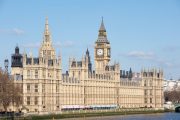In Broken Vows — Tony Blair: The Tragedy of Power, a newly published biography of former U.K. Prime Minister Tony Blair (shown on left), British investigative journalist Tom Bower charged that, while prime minister, Blair instructed his ministers to admit 350,000 asylum seekers into the U.K. by labeling them as being “economic migrants.”
Bower’s book, which is presently being serialized in Britain’s Daily Mail, accuses Blair of “presiding over a silent conspiracy” that allowed two million migrants to enter Britain during his term in office from 1997-2007.
In an article about the book published on February 26, James Slack, the Daily Mail’s political editor, summarized many of Bower’s accounts, including Blair’s order to his Labour government ministers and aides never to discuss in public the supposed “advantages” of his government’s relaxation of immigration restrictions. Slack noted:
The main aim of allowing in millions of people was to make the country “see the benefit of a multicultural society.” The Blair government did not see its job as being to “control immigration.”
While researching his book, Bower wrote that he “interviewed dozens of junior and senior officials, permanent secretaries and all the Cabinet secretaries from the Blair years as well as successive junior ministers and Cabinet ministers. In total, I spoke to 200 people.”
Blair, notes Bower, is said to have told ministers and officials: “Don’t mention the advantages of immigration in public because they won’t even want that.”
When the Blair government’s relaxation of immigration restrictions resulted in huge numbers of asylum seekers migrating to the U.K., Blair and his administrators repackaged them as “economic migrants” to avoid potential objections to the policies. In all, 350,000 asylum seekers benefited from the redesignation. During 2002 alone, Blair approved 150,000 work permits for these “economic migrants,” with most of these going on to become U.K. citizens.
In Slack’s opinion, the most incredible revelations in Broken Vows are related to Barbara Roche, an MP who served Blair as Britain’s first minister of state for Asylum and Immigration from 1999-2001.
Slack wrote that during her tenure as Asylum and Immigration minister, Roche “quietly adopted policies — with Mr Blair’s approval — that changed the face of the UK.”
Slack continued:
[Roche] changed the rules to allow more work permits to be issued, especially to people who would previously have been considered asylum seekers. Stephen Boys Smith, who was then head of the Home Office’s immigration directorate, said: “It was clear that Roche wanted more immigrants to come to Britain. She didn’t see her job as controlling entry into Britain, but by looking at the wider picture in a ‘holistic way’ she wanted us to see the benefit of a multicultural society.”
In Broken Vows, Bower quoted a statement from Jack Straw, Tony Blair’s first home secretary, who once asked Blair in a worried tone: “Isn’t immigration the sort of issue which can blow up in our face?”
Blair dismissed Straw’s concerns, saying: “Immigration won’t be an issue. Immigration is good for Britain.”
Slack observed in his commentary about Broken Vows:
The true story of how Labour not only lost control of immigration but actively encouraged it can only now be told — thanks to detailed testimony from the civil servants and ministers who witnessed and participated in the hithero concealed twists and turns of the government.
Blair’s tenure as prime minister ran from 1997-2007, and his time as head of Britain’s government included the 9/11 terrorist attacks in the United States and the subsequent 2001 invasion of Afghanistan and the 2003 invasion of Iraq, both of which involved British troops. Slack tells us that a segment of Broken Vows, which will be serialized in the Daily Mail soon, will reveal “A devastating dossier on how Mr Blair deceived his Cabinet, Parliament and the country into war in Iraq.”
Blair apparently has a penchant for going to war, according to a Wikipedia article that notes: “In his first six years in office Blair ordered British troops into battle five times, more than any other prime minister in British history. This included Iraq in both 1998 and 2003, Kosovo (1999), Sierra Leone (2000) and Afghanistan (2001).” To those military operations, we can also add, as we have seen, Iraq in 2003.
Testifying before Britain’s Iraq Inquiry on January 29, 2010, Blair justified his role in the invasion of Iraq by saying that Saddam Hussein was a “monster and I believe he threatened not just the region but the world.” He said he believed the world was safer as a result of the invasion and that there was “no real difference between wanting regime change and wanting Iraq to disarm: regime change was US policy because Iraq was in breach of its UN obligations.”
In justifying the invasion in such terms, it is not surprising that Blair was such a staunch ally of the interventionist, neoconservative President George W. Bush.
While the lax immigration polices initiated by the Blair government may have initially had mostly an economic impact on Britain, the refugee crisis in Europe during the last few years has created a more serious threat. That crisis has sent tens of thousands of migrants from Syria and neighboring countries into Europe, increasing the likelihood that terrorists could enter European countries among the refugee flow. This threat was made more plausible after the terrorist attacks in Paris on November 13, which were orchestrated by several terrorists who entered Europe posing as refugees.
A February 26 article in the Daily Mail speculated that thousands of the refugees missing in Germany “might even be on their way to France and Belgium in a bid to try to sneak into the UK, where asylum seekers are given accommodation, benefits, health care and education.”
If such widespread illegal entry into Britain does take place, the stages for it were very likely set by the immigration policies initiated under Tony Blair. In addition to creating porous borders and reducing Britain’s ability to control immigration, Blair’s interventionist foreign policy (along with that of the United States) also destabilized the Middle East and was responsible for the ongoing flood of refugees bound for Europe.
Former Representative Ron Paul (R-Texas), in a recent article reprinted by The New American, offered his explanation for the reasons behind the current European refugee crisis. He noted that while we all sympathize with the plight of the displaced people, we must keep in mind “that this is a man-made crisis and it is a government-made crisis.” The former congressman, who is well known for his advocacy of a non-interventionist U.S. foreign policy, wrote:
The reason so many are fleeing places like Syria, Libya, Afghanistan, and Iraq is that US and European interventionist foreign policy has left these countries destabilized with no hopes of economic recovery. This mass migration from the Middle East and beyond is a direct result of the neocon foreign policy of regime change, invasion, and pushing “democracy” at the barrel of a gun. [Emphasis added.]
Britain, especially during the Blair years, was an enthusiastic partner in the intervention that destabilized Iraq and neighboring countries. Paul noted:
The Europeans share a good deal of blame as well. France and the UK were enthusiastic supporters of the attack on Libya and they were early backers of the “Assad must go” policy. Assad may not be a nice guy, but the forces that have been unleashed to overthrow him seem to be much worse and far more dangerous. No wonder people are so desperate to leave Syria.
Britain’s immigration and foreign policies under Blair closely resembled similar U.S. policies under presidents Bush and Obama. And both English-speaking nations, which have long been considered leading players on the world stage, have suffered similar negative consequences resulting from these failed policies.
Related articles:
Tony Blair “Apologizes” for Iraq War but Keeps Lying
Will Cameron’s Rhetoric on EU Migration Threat Appease Brit Voters?
Socialist Tony Blair Calls for a Strengthened European Union
Labour Party Immigration Tidal Wave Has Swept over UK




